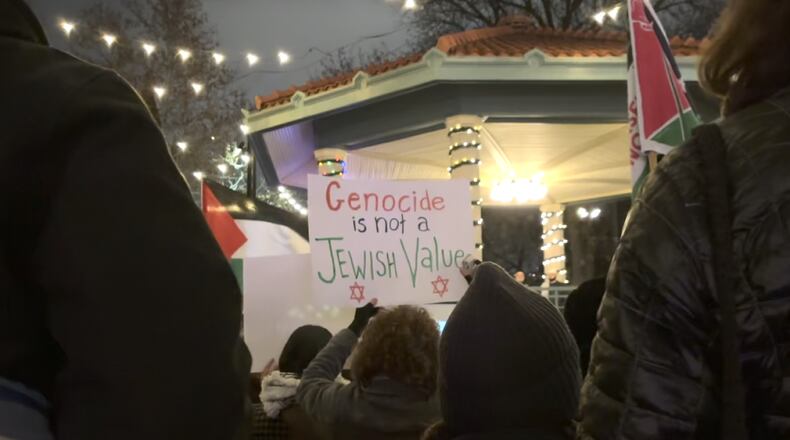“I already lost a friend. I already lost my cousin,” said Aya Hijji, a Palestinian-American.
Born in Virginia, she said she spent most of her life in Gaza. Hijji shared her story with the crowd during the vigil, expressing her grief for the loved ones she said she’s lost in the ongoing conflict.
“It’s not fair for them to go through this. They’re innocent civilians,” she said. “As of right now communication has been lost. We still have my cousins, my aunts, my friends that lost their homes, who have lost their kids.”
Hijji joined some of the leaders of the attending faith groups to call for peace and solidarity for the Palestinian families and children in Gaza.
Joel Pruce was another speaker. The Jewish-American is a professor of human rights studies at the University of Dayton and the grandson of Holocaust survivors.
“I believe deeply that my Jewish values demand that I speak up and be present with you so that together we can build global movements for peace and for dignity of all people,” Pruce said. “I am here today to join you and the world in calling for an end to the ongoing genocide of Palestinian people and end to the totalizing and violent destruction underway in the Gaza strip. As a Jew, I know darkness and I know harm and I know fear and I know displacement and I know mass murder because the memory of my people’s trauma was passed down to me by my ancestors.”
Sunday’s vigil was the the latest local show of support for Palestinian people.
The Israel Defense Forces launched a military response more than two months ago after Gaza’s ruling group Hamas attacked the Middle Eastern country on October 7. The attack killed roughly 1,200 Israelis in what is considered the deadliest attack on Jewish people since the Holocaust.
Meanwhile in Gaza, the death toll is estimated to be upward of 20,000.
“Almost, I would say, 10,000 of those are children,” said Lisa Saia, who organized the vigil.”
She said the interfaith coalition condemns all violence but argues the Palestinian people have undergone decades of oppression, and that tensions reached a boiling point on October 7.
“What’s happening in Palestine is a continuing crisis and they’re not getting they aid that they need to survive,” Saia said.
Hijji echoed Saia’s stance. Despite the deaths brought on by Hamas’ actions that day, she said she defends the attack.
“Resistance is justified when people are occupied and we have been occupied for more than 75 years,” Hijji said.
About the Author
